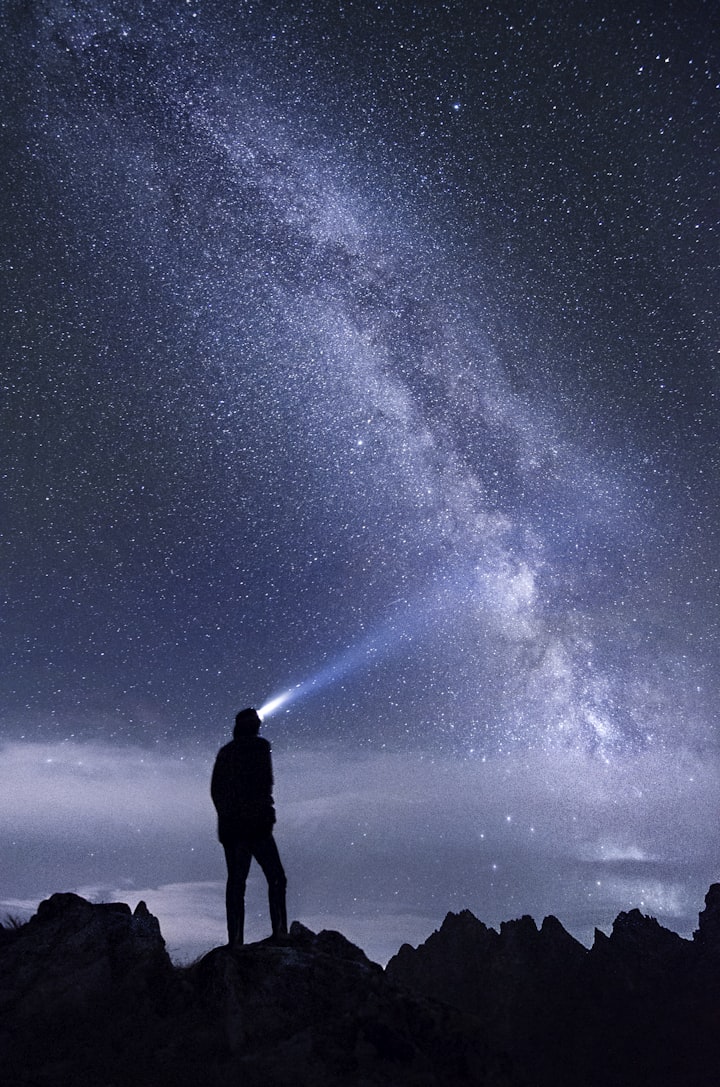
No one remembered if it was the Lovers or the Astronomers who first noticed the stars were disappearing. When there was only one left no one really cared who pulled the alarm.
Alistair was an Astronomer. He had come forward from the past to help people remember when the stars came out at night. He knew back when that the stars were illusions, pinpoints of light, burning into the darkness long ago and far away. "Look up," he would say to the Lovers, "and see the dying of the light, stars twinkling out of existence."
"Why do they twinkle?" one had asked.
They only seem to twinkle," replied Alastair, "As the star's light shoots through our sky at night, it jumps around, bouncing and bumping through thicker and thinner, hotter and colder layers of air."
He paused for a moment to remember the rest. "The starlight is bent up and down, side-to-side, and that makes it seem as if it is twinkling. What's really happening," he added, "is that the light is wobbling. But wobbling," he went on to say, "is not very poetic."
No one cared whether the last star twinkled or wobbled, especially the Lovers. They recited the new version with as much fervor as the old. "Starlight, star bright, final star I see tonight …".
"Perhaps now," he thought, "I can put away my telescope and stop lugging it up the hill every night."
He was the last Astronomer on Earth. He had returned from the past when the sky was filled with stars. He had spent his years at his college teaching Lovers about them. When he came from he knew them all by name - Proxima Centauri, Betelgeuse, Canopus, Sirius, and more. It was always, he believed, one of the great ironies that we could only see the other twinkling stars in the night sky after our own star set every evening.
It was that fear, about the very sun that gave light and life to the Earth, that concerned him the most. It truly would be the last star before it too "blinkled out", and everyone would be plunged into a dark and cold death. He came here to warn them it would happen and soon.
There was a time not long ago when he preached that there were 100 billion observable galaxies in the Universe. At an iHop one night, he calculated on the back of a napkin about 100 billion stars were being born or dying each year. "That," he thought to himself, "comes out to about 275 million each day."
That was then. This is now when there is only one left, and it would soon be gone.
When they all started to "blinkle out" - the new catchphrase used to soften what was happening - he sat upon a rock by the sea with his flashlight and just watched one after another blinkle out. They didn't fade or grow dimmer, they just disappeared. Poof. Gone. He liked being an Astronomer, he liked the stars. Their names and history. The ways they gave light and hope to the darkest moonless nights, helped guide the way through unknown waters for seafaring navigators, provided the basis for stories about ancient gods and goddesses, and gave Lovers something to gaze upon aside from one another.
He would miss them. He was afraid of the dark. The stars had always been his nightlight against the monsters. He had come to this time to show them what the sky used to look like. Use his virtual planetarium that lit up the sky anywhere and everywhere across the world, any and every night, when the starless darkness took hold and fear gripped people's hearts and minds.
Once their sun was gone, their moon would reflect only darkness. The Man in the Moon would be gone. The cow would no longer be able to see where to jump over. Croon would have no romantic rhyme.
As a young man, he rafted down the Grand Canyon with the Colorado River Rats and beached each night on the sandy shores that gathered at the bends in the river. He would lie back on his sleeping bag. surrounded by mile-high canyon walls and watch as a bowl of a zillion stars rotated overhead. One night, before Ambien caressed him into a dream, he decided to be an Astronomer.
He often referred to it as "the oldest profession" and it was. Before there were Lovers, there were Astronomers scanning the night sky to discover the culture of the heavens.
When the sky was filled with stars it had been a good choice. Most Lovers wanted to know the names of stars, their formations, and how to find them. They longed to know the astrology of the heavens. Alastair knew that as well. There was Aries The Ram, Taurus The Bull, Gemini The Twins, Cancer The Crab, and so many more. What would the Lovers do without them? What would they do when all the stars had blinkled out?
Perhaps it was time to become a Lover. Astronomers needed stars. Lovers only needed other Lovers. It was a thought he had the night the last star went dark. He was watching from his rocky perch. The moon was waning, the night sky afforded a good cloudless view of the heavens. "We have no idea," he mused "where they come from or why they're here. Now," he thought "we have no idea where they are going."
He remembered the one poem he memorized as a young lad when he was still trying to be a Lover. It was written by Jeanette Winterson and felt appropriate for this night of the last star. He slowly mumbled the words to himself with no special Lover in mind.
"The probability of separate
worlds meeting is very small.
The lure of it is immense.
We send starships. We fall in love."
And the next-to-last star was suddenly no longer there. A single tear fought its way out of the corner of his eye, his heart's way of saying farewell when there were no words left.
About the Creator
David Grebow
My words move at lightspeed through your eyes, find a synaptic home in your mind, and hopefully touch your heart! Thanks for taking the time to let me in.
Reader insights
Outstanding
Excellent work. Looking forward to reading more!
Top insights
Compelling and original writing
Creative use of language & vocab
Easy to read and follow
Well-structured & engaging content
Excellent storytelling
Original narrative & well developed characters
Expert insights and opinions
Arguments were carefully researched and presented
Eye opening
Niche topic & fresh perspectives
Heartfelt and relatable
The story invoked strong personal emotions
Masterful proofreading
Zero grammar & spelling mistakes
On-point and relevant
Writing reflected the title & theme






Comments (1)
Wow this was soooo beautiful! Astronomers need stars. Lovers need lovers. A strong entry!